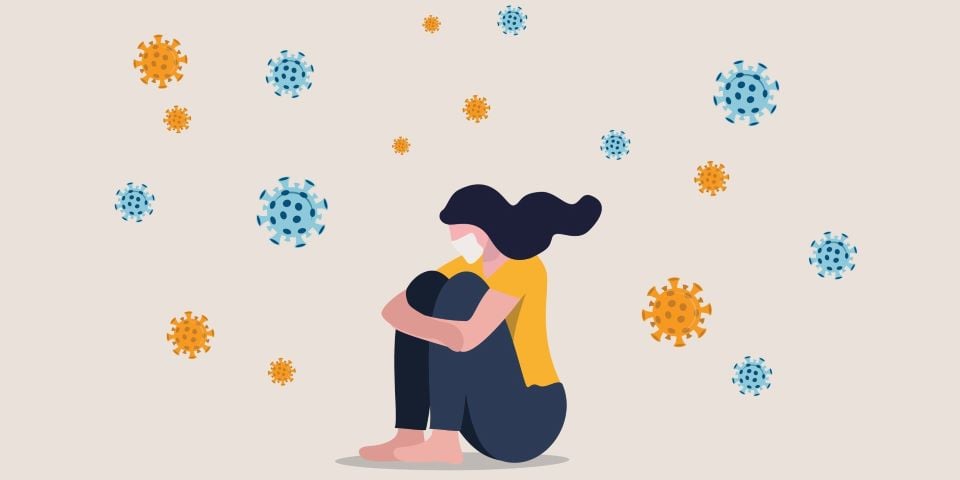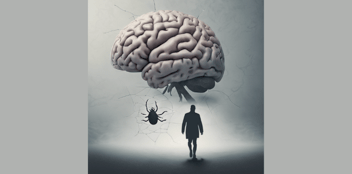Are Infectious Diseases the Root Cause of Psychiatric Illness?
- Home
- Blog

What you will learn in this blog:
Viral or bacterial infections are well known for causing physical distress, both in the short- and long-term. But could they also be the cause of you or a loved one’s mental distress? Exciting new research suggests the answer to this question may be “yes”—and the conclusions could usher in a new era of psychiatric treatment. What makes a person more vulnerable to infectious disease-induced psychiatric illness… and is there any hope for a cure? Read on to find out!
The Link Between Psychiatric Illness and Infectious Diseases
Dear Reader: have you ever wondered why a psychiatric illness develops, and what turns it into a chronic condition rather than an acute illness? Answers to these questions are crucial to alleviating the suffering of patients with chronic emotional illness, yet have remained elusive, until recent scientific breakthroughs. I believe these discoveries will revolutionize the practice of psychiatry, and improve the lives of millions of patients. Exciting research is demonstrating that many chronic psychiatric conditions are triggered by common infectious diseases such as Lyme Disease, strep, mono, COVID, and Herpes. What would it mean to you or a loved one suffering from a chronic mental illness to learn that a virus or strain of bacteria may be the ultimate culprit—and that an antibiotic or antiviral medication may be the key to successful treatment?
Viruses and Bacteria May Attack Your Mental Health Ecosystem
New scientific discoveries showing how viruses and bacteria can destructively interact with your “mental health ecosystem”—comprised of your immune system, gut microbiome, and personal genetics—are resulting in a huge paradigm shift in the field of psychiatry, neurology and immunology. These new discoveries may help explain the root causes of your psychiatric symptoms and their persistence over the years, and could open the door to adding immunotherapy to traditional psychiatric medications.
If you or someone you love has suffered from a chronic emotional illness that has been difficult to diagnose and treat, there may be “non-psychiatric” answers related to your immune system and its response to infectious diseases to help you feel well for good. Let’s dig in!
Which Common Infectious Diseases are the Root Cause of Psychiatric Illness?
New evidence demonstrates that infectious diseases such as Epstein Barr Virus (the cause of mononucleosis) can trigger and perpetuate Bipolar Disorder, and that Lyme Disease can trigger and perpetuate many conditions, including developmental disorders, autism spectrum disorders, schizoaffective disorders, bipolar disorder, depression, anxiety disorders, eating disorders, decreased libido, sleep disorders, addiction, opioid addiction, cognitive impairments, dementia, seizure disorders, suicide, violence, anhedonia (lack of pleasure in life), depersonalization, dissociative episodes, derealization, and other impairments.
Long COVID has served as an impetus for bringing many of these new discoveries into the spotlight. Long COVID’s psychiatric manifestations can include depression with anhedonia, anxiety, and cognitive impairment (brain fog), as well as disturbances such as psychosis, obsessive–compulsive disorder (OCD), post-traumatic stress disorder (PTSD) and sleep disturbances.
Many other infectious agents have also been implicated, including tick-borne illnesses such as Babesia and Bartonella, Coxsackie virus, Candida, Mycoplasma (a source of pneumonia), and others.
How Infectious Diseases Attack the Brain
Infectious diseases like the ones described above can trigger what is now known as “Infection-Induced Autoimmune Encephalopathy”, an abnormal immune system response resulting in inflammation of brain tissues. This response can also lead our immune system to create antibodies that attack our brain’s own neurons in addition to the virus or bacteria itself, making symptoms worse.
Here’s how that can happen: on their surface, invading bacteria or viruses can share many of the same proteins that lie on the surface of our brain cells, which is known as “molecular mimicry.” Certain factors—such as genetics, problems in our gut microbiome, specific toxins, and others—can weaken our immune system functioning. In a weakened state, our immune system can get “confused” about what, exactly, it is supposed to attack. Antibodies and white blood cells mark the bacteria or virus as “invaders” to rid the body of them, but because of the similar protein signature, they go after our own neurons and synapses and attack them as well… leading to significant consequences for our psychiatric state.
Is the Root Cause an Active Infection, or a “Hit and Run?”
Sometimes the virus or bacteria hides out in the body in a dormant state, lurking and ready to activate once again under certain stressful conditions. At other times the infectious diseases cause a “hit and run” condition—even though our immune system gets rid of these “bad bugs”, their damaging effects may persist for months or years and cause numerous emotional and cognitive problems
Are Antibiotics and Antiviral Medications the Future of Psychiatric Care?
Psychiatric medications can help stabilize and improve mood and anxiety and insomnia symptoms, and treat psychosis—and many also modulate the immune system by reducing inflammation. These medications play an important role in the lives of many patients. That said, the future of psychiatric care may very well include immunologic medications as well.
This “immunologic” approach to treating psychiatric illness first involves using sophisticated laboratory tests to diagnose brain inflammation and autoimmunity. These tests might include The Cunningham Panel, IncellKINE, IGeneX, and others. I will be discussing these tests in future blogs. Depending upon the test results, referral to an infectious disease specialist, immunologist, or integrative medicine doctor is often the next step. A psychiatrist will work collaboratively with these doctors to determine each of the root causes of the chronic psychiatric illness.
For example, has a patient’s Lyme Disease been reactivated after lying dormant? Has their mono infection come back? Is there an active strep infection? Are there antibodies to brain tissue? Depending upon what the tests show, treatment may involve antibiotics, antiviral medications, immune modulating medicines such as IVIG or Rituximab, or others such as maraviroc, aspirin, celecoxib, statins, and more.
Using Immunologic Medications to Fight Psychiatric Illness: An Expert’s Perspective
My colleague and friend Dr. Gary Kaplan, an integrative medicine specialist and founder of the Kaplan Center for Integrative Medicine and the Foundation for Total Recovery, has pioneered the evaluation and treatment of infection-induced autoimmune conditions. Here is what he has to say about the present and future possibilities of this type of approach:
“We are at the beginning of a revolution in medicine. Immune dysregulation caused by an infection is in and of itself not a new concept in medicine. But the idea that immune dysregulation caused by an infection may be the underlying cause of diseases as varied as depression, obsessive compulsive disorder, chronic fatigue syndrome, fibromyalgia, chronic Lyme syndrome, post COVID syndrome and many others is not only revolutionary—it also presents us with an opportunity to not just treat symptoms but legitimately talk about a pathway to a cure. This approach also presents us with a number of challenges as it requires us to think completely differently about why people get sick.
“What is unique about the people who develop chronic illness? Post-COVID syndrome affects somewhere between 10-30% of people who get sick. Chronic Lyme impacts about 20% of people who get Lyme disease. Everyone else gets sick and then fully recovers. Why? Genetics is unquestionably part of the answer. This is a rapidly developing area which is already guiding our therapies. The other issue is epigenetics. Literally meaning 'on top of the gene,' epigenetics is the study of how the environment can modify gene expression without actually changing the gene itself. Environmental factors that can 'set us up' for chronic illness include early childhood trauma, environmental toxins such as mold toxicity, and heavy metals such as mercury or lead toxicity. Pesticides and herbicides in our food, sleep disorders, even our diet can cause multiple problems. All of these things can cause damage to our 'second brain'—the gut microbiome—and can modify our gene expression to weaken our immune system. A weakened immune system is at risk of misfiring and over-reacting, making mistakes and becoming the problem itself.
“Treatment requires an individualized, whole-person approach: identifying and addressing all of the issues that 'set you up'; looking for, identifying, and treating any infections that may have been missed; and fixing the immune system that has become part of the problem. This is the path to recovery.”
The Next Great Frontier of Root Cause Psychiatry
Reader, in prior blogs I have shared with you two of the great frontiers of psychiatry: genetics and the gut microbiome. The next great frontier is our immune system. If you or a loved one are suffering from a chronic mental illness, emerging scientific discoveries in the field of “psychoneuroimmunology” can bring you hope through the use of cutting-edge laboratory tests that uncover its root causes, and help guide treatment. These biotechnologies are advancing at a breathtaking pace, and I am incredibly excited about how they can pave the way to bring hope and alleviate the suffering for those who are struggling with chronic emotional problems.
Psychoneuroimmunology is so important that I will be writing my next twelve blogs about how it may finally bring you the answers that you (and your physicians) have long sought. I hope you’ll join me as we explore this new frontier together.
.png?width=144&height=144&name=Untitled%20design%20(34).png)



